- Home
- Nancy Buckingham
The Silver Castle Page 3
The Silver Castle Read online
Page 3
Frau Kreuder was silent, gazing into the fire as she considered what I’d told her. I knew that she found my explanations difficult to accept, and I couldn’t altogether blame her for questioning my motives. Even Colin had taken it for granted that I’d want to cash in on the situation.
On a sudden impulse, I said, “You must have known my father well. Did he ever refer to me?”
“Not recently, not for a long time. But when I first knew him, almost twenty years ago, he admitted, quite frankly, that he had deserted his wife and a baby daughter. Benedict was not proud of the fact, but he insisted that he’d had no option. The domestic scene inhibited his work. He should never have married, and when he realised his mistake he knew he had to sever all contact. You must not blame him too much, my dear. A man of genius is above the ordinary rules of behaviour.”
Did I blame him? Perhaps he had acted for the best, but I still felt a sense of rejection that was like a dull throbbing in my breast. I knew it would remain with me for a long time. Perhaps forever.
Frau Kreuder seemed suddenly to cast aside her doubts about me, as if my obvious distress had convinced her where my words had failed.
“Now we must be practical,” she said. “Where are you staying, Gail ... I may call you Gail?”
“Please do.”
“And my first name is Sigrid. So, about your accommodation?”
“I haven’t fixed anything yet, but I don’t expect I’ll have much difficulty. I was thinking of staying in the district for a couple of weeks, just to get the feel of the place and learn what I can about my father.”
“Then why not stay here?” I must have shown my surprise, for she added smoothly, “Where better? We have plenty of room, and no other guests are expected during the time you’ll be staying. It would give me pleasure, Gail. Your father and I were close friends.”
“It’s most kind of you,” I said, half uncertain about the wisdom of accepting.
“Then that is settled. I am so glad. I will ring for Ursula to prepare a room for you.”
Her summons was answered at once by a stolid woman dressed in a green nylon overall. Sigrid Kreuder gave her instructions in rapid dialect German, and the servant gave me a startled glance when she understood that I was to stay. By the time she withdrew I had my next question carefully prepared. It was the question that had nagged at me remorselessly.
“Tell me, please, why did my father take his own life?”
Sigrid Kreuder sighed, making a gesture of helplessness. “Who can ever say what drives a man to such a deed?”
“But how did it happen?” I persisted.
Her eyes closed in remembered pain. She spoke in little above a whisper. “Benedict was found drowned, here in the lake.”
“But couldn’t it have been an accident?”
She shook her head wordlessly, looking much distressed. I was afraid that if I pressed her for more details she might break down.
Curbing my impatience, I gave her time to recover her poise by glancing around the room, really seeing it for the first time. To its elegant proportions, to the choice pieces of rosewood and mahogany, an added sheen had been achieved by the lavish use of silken fabrics ... damask drapes at the windows, panels of watered silk on the walls. Exquisite brocades, in subtle shades of green and gold and ivory, covered the chairs and sofas.
Sigrid Kreuder was watching me now. She gave a little smile.
“An understandable extravagance. You see, we are silk weavers. My husband, Friedrich, has been dead for some years now, but his two sons continue to run the silk mill. My own boy, Raimund, and my stepson, Anton, who is away from home at present on a business trip to America. You will be meeting Raimund later.”
“I shall look forward to it,” I murmured politely. There was one thing I could ask her without, I hoped, causing further pain. “I wonder if you have any photographs of my father. I don’t even know what he looked like.”
“Yes, I think I have one handy.” She spun her chair expertly across the room and searched in the drawer of a sofa table. “Yes, here it is ... not very good, I’m afraid. I have one or two other snapshots in an album which I will show you later, but Benedict was always a difficult subject to photograph.”
My father was standing in the open doorway of his chalet, facing the bright sunlight. He was not a tall man, but there was no hint of middle-aged thickening around the waist and jaw. Dressed casually in corduroys and a shapeless beige sweater, he was unsmiling, as if impatient with the fuss of having his picture taken. His light brown hair, like my own, seemed to glint with hidden highlights. The green-blue eyes that looked out at me were my eyes, I realised with a sense of shock.
“Is he as you expected, Gail?”
“I hardly knew what to expect. I can see that I’m a little like him.”
“More than a little,” she said softly. “The way you stand, even something in the way you speak. And I have a suspicion that, like Benedict, you are not the most patient of mortals.”
“Oh dear, does it really show?”
She smiled. “Put that photo away now, my dear, and later I will get copies made for you of all the ones I have.”
I slipped the snapshot back into the open drawer on top of some others there. As I went to close it, my glance was arrested by a familiar face. The picture was of a man and woman standing together on a ski slope ... she strikingly lovely with a fine-boned beauty and wide eyes that laughed at the world without fear. But it was the man who had caught my attention.
“Who are they?” I asked with an urgent curiosity I couldn’t conceal.
Sigrid moved her chair closer to look. I heard a quickly indrawn breath, but she answered me calmly enough.
“That is Anton, my stepson. Why do you ask?”
“Oh ... I’ve seen him before, that’s all.”
“Seen him before?” She stared at me in bewilderment. “Where can that have been?”
“When I was driving through Zurich today,” I explained. “I got stuck in a one-way street, and he helped me get myself out of trouble. I think he’d just come out of a shop.”
“I see. Quite a coincidence. Anton must have gone there on his way to the airport.” There was a considered pause. “Did you tell him who you were?”
I shook my head. “I had no reason to. We were just two strangers whose paths happened to cross.”
The tension slackened and Sigrid Kreuder once more became the considerate hostess.
“I expect you would like to go to your room now,” she said. “Karl will have taken your luggage up already. We dine at eight. I am sure you and Raimund will get on splendidly together. Tomorrow, perhaps, he will take you on a little sight-seeing excursion.”
“That would be nice, if he can spare the time.” I hesitated, then asked lightly, “When will your stepson be returning?”
“Oh, not for some while. He has a lot to attend to, and many people to see.” She pressed the bell again to summon the servant. “Anton will not be home until you have returned to England.”
I felt a curious sense of disappointment that, after all, I would not be meeting him again. And if I judged Sigrid Kreuder’s tone correctly, she was very anxious that I shouldn’t.
I followed Ursula upstairs, and it emerged that she was the wife of Karl, the chauffeur. Although not unfriendly, I sensed a certain wariness. But perhaps it was just that her English wasn’t very fluent
Only when Ursula had ushered me into my room and withdrawn did it occur to me that I’d been offered no explanation about the attractive woman who stood beside Anton Kreuder in the photograph.
Chapter Three
The rain had continued far into the night and I’d lain awake and listened to it slashing against the windowpanes. But now the early morning sun glowed through the damask curtains, suffusing the room with soft saffron light. On a mounting surge of excitement I slipped out of bed to see the view from my window.
I stood looking out at a breath-robbing scene of sunlit water and forested
slopes and distant, snow-crested mountains. Far across the shimmering breadth of the lake, half-hidden among trees, I could pick out scattered townships, each a cluster of rose-red roofs gathered around a steepled church. Below me the garden of the Schloss was a tapestry of cool spring colour, sloping gently to the lakeside where a yellow sailing dinghy was tied up beside a jetty.
By my watch it was still not seven o’clock and the house seemed silent But an urge to be out of doors prompted me to hurry and get dressed. A faint chink of crockery and the aroma of coffee came from the kitchen quarters as I made my way downstairs and let myself out by a side door.
I kept to the paths, for the lawns were sodden, the grass heavy with droplets that glittered in the sunlight like a scattering of diamonds. A flight of weathered steps led me down between two flowering cherry trees to a paved terrace at the lake’s edge. With my hands resting on the curved stone balustrade, I gazed out across the water at the rosy blaze of colour in the eastern sky—a shepherd’s warning sky, I realised now. Two swans glided towards me, prepared to accept my offerings; then finding I had no titbits for them, they veered away with stately disgust
“You are out early.”
“Oh, hello, Raimund.” His silent approach had startled me, but I managed to conceal it. “What a glorious morning.”
He glanced at the red sky. “It’s nice for the moment, but take my word, Gail, it will not last. I observed you from my window and decided to come out and join you.”
“I’m flattered.”
I had met Raimund Kreuder last night at dinner. It had been a pleasant, civilised evening, with first-class food and wine, yet I’d felt curiously ill at ease. Although we had talked a good deal about my father, about his paintings, I’d sensed that I was being gently but firmly nudged away from anything that mattered. Whenever I put a direct question to either Sigrid or her son they somehow slid past the point and, as their guest, I’d not felt able to press them. Was their apparent reluctance to discuss Benedict Sherbrooke’s death a matter of thoughtfully sparing my feelings, I wondered, or were they trying to conceal something from me?
Raimund nodded towards the dinghy, which rocked gently beside the jetty in the wake of a passing motor boat.
“Do you like sailing?”
“I don’t know. It’s something I’ve never tried.”
He gave me a lazy grin. “That must be corrected. Sailing is an experience no attractive girl should be without.”
He was wearing dark slacks and a white thick-knit polo-neck sweater, looking casually elegant. He had the same ruggedly attractive looks as his half-brother. But whereas Anton Kreuder’s eyes had been grave even when he smiled, Raimund’s eyes seemed to be permanently alight with amusement.
“You and your brother are very much alike,” I said impetuously.
He gave me a measuring look.
“Mother mentioned to me that you had crossed Anton’s path. Quite a coincidence, wasn’t it? Still, I think I do not take the comparison as a compliment, exactly.”
“Why not?”
“We’re a little alike to look at, yes. But in character we are complete opposites.”
“In what way?”
“You could say that Anton’s life revolves around the silk mill.”
“And yours doesn’t?”
“I like to enjoy myself, too.” He jerked his head at the dinghy and held out a hand invitingly. “Coming?”
“What, now?”
“Just for half an hour. There is enough breeze to make it interesting, and that sheepskin jacket of yours looks quite warm. You’ll come back with a raging appetite for breakfast.”
I smiled. “Okay, it sounds fun.”
He handled the boat expertly, and I found that I had nothing to do but hang on and duck under when the boom came around. There was little else on the water except for a lake steamer, white and sleek, the Swiss national flag fluttering in the stern. From here the Schloss Rietswil stood isolated on a stretch of wooded shore, gentle hills rising above it, the starker snow-clad mountains beyond. I should have felt exhilarated, but as I caught sight of the little timber chalet halfway up the nearest slope, a mood of depression took hold of me.
“Where was it my father was drowned?” I asked. “Was it near here?”
Raimund avoided my eyes, looking past me into the distance.
“Yes, quite near.”
“How did it happen?”
“Does that matter?” The taut expression on his handsome face softened at once into compassion. “Honestly, Gail, where will it get you to probe into the painful details?”
As we skimmed the water, heading straight into the sun, I said heavily, “Don’t you see, I want to try and understand my father, and to do that I must find out all I can about him.” I sighed. “It seems such a tragic waste. If my father had lived only another two months he would have known the beginning of the public recognition he longed for. And I would have heard about his painting being sold at Waterman’s and come to seek him out. I’d have had the chance to get to know him while he was still alive.”
“You might not have liked the man you found.”
“I don’t need telling that. Apart from anything else I can’t forgive him for deserting my mother and me. It was a heartless thing to do, whatever the circumstances, and she must have felt terribly bitter. I’m sure that’s why I was never told anything about him and allowed to believe that he was dead. But nobody can be all bad, Raimund, and I want to know what my father’s good qualities were. Maybe I can even come to understand the urges that drove him. I want to know how much of him there is in me.”
“Very little, I should imagine, except that you have inherited his artistic talent. I cannot see you ever deserting a small child.”
“Of course not, but it’s different for a woman,” I said with a flare of impatience.
“Is it not enough for you, Gail, that you’re the daughter of an artist of real stature? You have a fine inheritance in the work of Benedict Sherbrooke. My mother thinks he was a genius.”
“And you? I noticed that you didn’t go out of your way to praise his work last night.”
Raimund started to coil the loose end of rope in his hand.
“I don’t pretend to be any judge of art. But my mother is, and I’m prepared to accept her verdict. She believed that Benedict was someone very special and she championed him always. It has been a passion with her, and she would have become his patron if Benedict had not been too proud to accept charity. Neither would he ever prostitute his art, as he saw it, by becoming commercial.”
“You tell me all this, yet you maintain that I should dismiss the man from my thoughts.”
Raimund shrugged. “As an artist yourself, you will learn everything that is worth knowing about your father from his paintings.”
We had reached a stalemate, each resentful of the other’s attitude. Raimund’s reluctance to tell me what I wanted to know made me furious. He seemed to be treating me like a child. Clearly my persistence angered him, but I refused to concede that he had any cause for resentment.
“I think I’ll go and see the local registrar, or whichever official it is who keeps the records,” I said defiantly. “I can get all the details of my father’s suicide from him, and where he is buried ...”
“He was”—he sought the English word—”cremated.”
So I’d not even have a grave I could visit.
“Well anyway,” I said, “I won’t bother you with questions that obviously upset and embarrass you.”
“You’ll be the one to be upset, Gail, if you insist on getting answers.”
“It’s a chance I’ll have to take. I want the truth about my father, not these constant evasions.”
Raimund’s mouth tightened. “All right then, damn you—if you must know, there was a woman involved. Only this one he did not desert, like your mother. He took her with him when he died.”
I felt cold and numb with shock. “Are you saying ... it was some kind of suicide
pact?”
“That is the official explanation. But whether she went willingly, or whether he made the decision for the two of them, is a matter for speculation.”
I closed my eyes, but I couldn’t shut out the horrifying picture. That my father had killed himself from a sense of failure and frustration was something I’d begun to come to terms with. But this was something else, something for which I was totally unprepared.
“I suppose she was married?” I said wretchedly.
He nodded.
“But I don’t understand. If they were lovers, why suicide? I mean, nowadays it’s just an empty gesture. Meaningless.”
“Benedict had a highly developed sense of drama,” Raimund said brutally. “Perhaps he thought it was the only way he would ever get his name in the newspapers.”
I flinched. “Who was the woman?”
Raimund punched the tiller and hauled on the rope so that the dinghy lurched as if nudged by some huge water monster. Then with a sudden thunderclap the sail filled and we surged forward.
“Stop punishing yourself, Gail,” he called against the rush of wind, “or I will start to think you are some kind of masochist.”
I believe we both felt that to say any more would only spark a real quarrel, so we stayed silent as we glided towards the shore.
At the jetty, Raimund suggested that I walk on ahead while he stowed away the sails. I took a different path from the one by which I’d come, attracted by the drifting scent of massed hyacinths and the glimpse of a sunny wall that was smothered in the tiny vermilion flowers of japonica. Beyond the wall, as I entered the courtyard, I saw a man climbing out of a rusty, battered vehicle something like a Land-Rover. He was ungainly, big-framed and swarthy, the stubble of several days’ beard blueing his chin. I thought he looked in need of a thoroughly good wash.

 The Other Cathy
The Other Cathy Design for Murder
Design for Murder Valley of the Ravens
Valley of the Ravens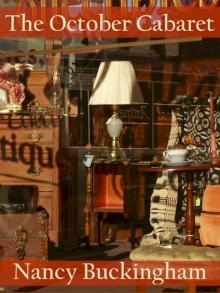 The October Cabaret
The October Cabaret Model Murder
Model Murder Murder in the Cotswolds
Murder in the Cotswolds Deadly Deceit
Deadly Deceit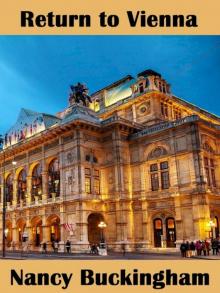 Return to Vienna
Return to Vienna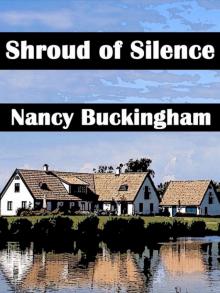 Shroud of Silence
Shroud of Silence The Silver Castle
The Silver Castle A Cotswolds Legacy
A Cotswolds Legacy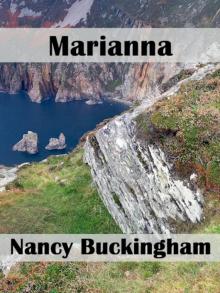 Marianna
Marianna Cold Coffin
Cold Coffin Kiss of Hot Sun
Kiss of Hot Sun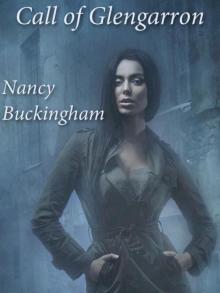 Call of Glengarron
Call of Glengarron Quest for Alexis
Quest for Alexis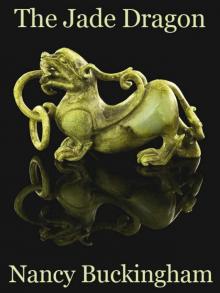 The Jade Dragon
The Jade Dragon